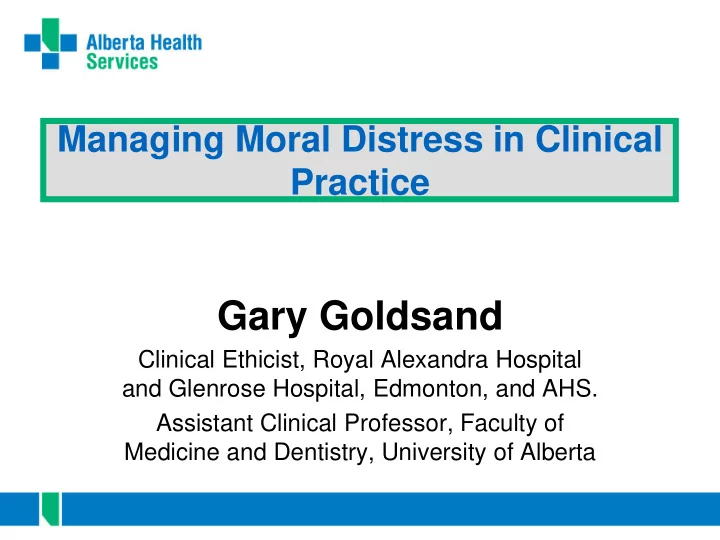

Managing Moral Distress in Clinical Practice Gary Goldsand Clinical Ethicist, Royal Alexandra Hospital and Glenrose Hospital, Edmonton, and AHS. Assistant Clinical Professor, Faculty of Medicine and Dentistry, University of Alberta
Topics for Series 2
Some Goals of Clinical Ethics Discussion. • To assist, clarify, and share thoughts on common ethical situations. • To promote reflection, and self-reflection, in clinical practice. • To acknowledge the presence of complexity and uncertainty. • To encourage the use and development of judgment in situations that demand it. • To share discussion around difficult questions. • To explore practical solutions to real dilemmas. 3
Sound Familiar? “ After working with this patient 2 days in a row, I feel drained coming home and I can ’ t do anything else, like play with my kids.” “ I compromised my professional self to save my personal self. I didn't do anything wrong, I just didn't do my best. ” “ I don't sleep well anymore since we started being so short staffed at the unit. ” “ I feel empty coming to work, I feel empty returning from work…I have no emotional reserves left.” 4
Sound Familiar? What happened on the unit last week was crazy! The team needed to talk about it, and said they would. Now no one has time to think about last week. I could say something, but…I just don’ t anymore – my supervisor keeps saying he’ll fix things, and he has not, but I have no capacity for conflict. I used to love coming to work, but recently I caught myself focusing on my computer screen, rather than my patients. 5
13 Signs of Burnout Henry Neils 1. Chronic fatigue - exhaustion, 1. Frequent headaches and tiredness, a sense of being gastrointestinal physically run down disturbances 2. Anger at those making 2. Weight loss or gain demands 3. Sleeplessness and 3. Self-criticism for putting up depression with the demands 4. Shortness of breath 4. Cynicism, negativity, and 5. Suspiciousness irritability 5. A sense of being besieged 6. Feelings of helplessness 6. Exploding easily at 7. Increased degree of risk seemingly inconsequential taking things 6
Burnout “ physical exhaustion including negative self-concept, negative job attitude, and loss of concern and feeling for patients ” (Keidel 2002: 200) 7
Moral Distress “ philosophic term used to denote a situation in which one is constrained from acting on a moral choice. … when, as humans, we believe we know how we should act, know what the right thing to do is, but find we cannot do it. ” (Austin and colleagues 2005: p. 199) 8
Compassion Fatigue “ natural behaviour and emotion that arises from knowing about traumatizing events experienced by a significant other, the stress resulting from helping or wanting to help a traumatized person ” (Figley 1995: 7) 9
Moral residue • That which accumulates when a professional feels she ’ s compromised her integrity and beliefs. • (Webster and Baylis, 2000) • ….Moral distress builds moral residue. 10
Aspects of clinical culture • Culture of “ truth telling. ” • Culture of “ blame and shame. ” • Culture of “ healing. ” • Culture of “ safety. ” • “ Just culture ” • Etc. • …..towards a culture of trust and respect?? • Direct Relationship between work culture and moral distress. 11
Balancing organizational values • Efficiency • Cost effectivenes • Long term sustainability • Excellence • Supportive of Staff 12
On Building and Destroying trust • Critical and complex patients provide opportunities for both of these. • Appropriate debriefing. • Awareness of “ dynamics of Respect. ” • Mindfulness about simple ethical principles - eg. The “ golden rule ” • Earned trust is an extremely valuable commodity. 13
Keys to Prevention • Understand the triggers that lead to moral distress. • Support quality improvement programs and the idea that we collectively must strive to learn from adverse situations. • Pay attention to the culture of one ’ s workplace, and be proactive in improving it. – Trust building – Regular communications to establish this. • Good personal relationships with those you encounter at work 14
Recognition • Be aware of the signs – with yourself, and among your peers, that indicate a “ moral distress buildup. ” 15
Management Options • Optimize Clinical Cultures. • Consider systemic contributors to, and alleviators of, moral distress. (and change them). • Clear separation between work and non work in one ’ s life. • Active support from colleageus and supervisors. • Others? • ……Moral distress can be reduced through a concerted effort among health care organizers, and all the clinicians who work with them. 16
Questions and Comments? • Thanks. • Gary Goldsand • Gary.goldsand@albertahealthservices.ca • 780 735 5330 17
Recommend
More recommend